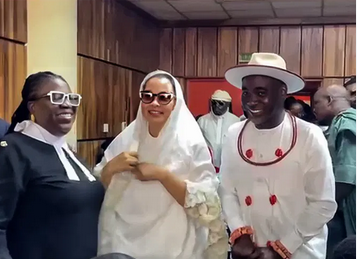Today, Senator Natasha Akpoti-Uduaghan appeared in court to answer charges of criminal defamation—a grave legal matter stemming from her televised accusation that the President of the Senate, Senator Godswill Akpabio, and former Kogi State Governor Yahaya Bello, conspired to assassinate her and were allegedly involved in organ harvesting. This is not fiction. These are not whispers. These were explicit allegations made on live television, broadcast to millions, and now echoing through homes, headlines, and history. When a person, especially one elected to high office, makes such incendiary claims without presenting evidence, it is not just reputation that suffers—it is public trust, institutional credibility, and civil peace that are endangered. In law and in life, a name is not a trinket. It carries the weight of a person’s character, their family’s honour, their professional standing, and their place in society. To drag that name through mud on national television without proof is not courage—it is recklessness. And it is right that such recklessness should meet its day in court. There are legal consequences for defamation, particularly when the accusation crosses from the realm of civil wrong into criminal misconduct—as is alleged here. Criminal defamation occurs when false statements are made in a manner that could incite hatred, contempt, or public hostility, thereby disturbing the peace and safety of those falsely accused. The law, in this case, is not ambiguous. It is not about silencing dissent or punishing free speech. It is about upholding responsibility—especially when a public figure uses their platform to throw serious allegations at named individuals without providing facts. There are legitimate defenses in criminal defamation: Truth: If the statement is factually correct, it is not defamatory. Public Interest: If the claim was made for the public good and backed by evidence. Privilege: If the statement was made in a protected legal or official setting. But in this case, no such evidence has been publicly presented. If Senator Natasha has any proof—any witnesses, any documents, any communications—then now is the time to bring them forward. The court offers her the opportunity not to cry foul, but to plead and prove. This is not a witch hunt. It is not gender-based persecution. And it most certainly is not connected to any other ongoing matter, as Dr. Oby Ezekwesili and others have wrongly implied. To tether this case to unrelated narratives is to erode its legal clarity and distort public understanding. This is a stand-alone case of one person making direct accusations against named individuals—not “some people,” not “they,” but specific names, now bearing the burden of public odium. Even stark illiterates know how to phrase suspicions without crossing legal boundaries. Senator Natasha, a trained lawyer and legislator, should have known better. To suggest that such a case should be ignored because of political affiliations or social sentiment is to say that the reputations of public servants are expendable. That truth does not matter. That names can be defamed without consequence. We must reject that idea. If we fail to prosecute criminal defamation when it occurs so egregiously, we are not preserving freedom—we are licensing falsehood. And in a democracy, falsehood is fatal. Let justice be done. Let it be done to those who were publicly accused, and let it also be done to the accuser, should she present credible evidence to support her claims. This is not about silencing women. It is about protecting everyone—men and women—from reputational assault in the age of cameras, microphones, and unguarded microphones. A democracy must never punish truth. But neither should it protect lies—especially when those lies wear the robes of drama and the crown of victimhood. Let the court decide.
Add A Comment


